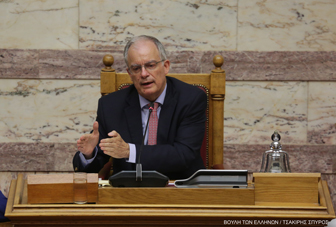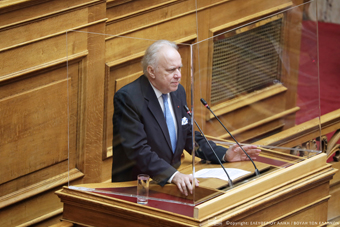Press Office
Athens, 22 February 2021
President of Parliament, Deputy Minister of Education and Religious Affairs and Representative of Main Opposition commemorate anniversary of proclamation of war of national liberation by Alexandros Ypsilantis

On the occasion of the anniversary of the bicentennial since the declaration of the war of national liberation by Alexandros Ypsilantis at the Danubian principalities, on 22 February 1821, the President of the Hellenic Parliament, Constantine Tassoulas, the Deputy Minister of Education and Religious Affairs, Professor Angelos Syrigos and the representative of the main opposition, Professor Georgios Katrougalos, commemorated, at the beginning of today's Plenary sitting, the crucial and defining events that constituted the prelude to the Greek Revolution.
The President of the Parliament, Constantine Tassoulas, said the following:
“200 years ago today, the afternoon of 22 February 1821, ladies and gentlemen colleagues, as you know, saw the prelude to the Revolution of 1821 at the Danubian principalities by Alexandros Ypsilantis, who, upon resigning from his post at the service of Tsar Alexander, crossed a tributary of the Danube, on the borders between Russia and the Ottoman Empire and walked towards the capital of Moldavia, Iasi. That area is part of Romania today.
The crossing of the river Prut constitutes the anniversary we are commemorating today in the Hellenic Parliament, which started a struggle that lasted for nine months in Moldavia and Wallachia, from February to September 1821. This struggle has been historically judged to have been a very strong distraction which facilitated the Revolution, its proclamation and the carrying out thereof, in southern Greece.
Ypsilantis may not have been victorious at Moldavia and Wallachia, but important moral victories were made at Dragashani, Sculeni, Secu Monastery and elsewhere, in a way that these developments, throughout the nine months, facilitated the favourable outcome of the Revolution on the first year since its proclamation up to the point when the first national assembly was held in Epidaurus on the 1st of January 1822 where our ancestors declared their national independence.
We, as a legislative body, honour this memory and commemorate this path. We honour the proclamation that Ypsilantis issued two days later at his military camp in Iasi, and which is being preserved at the National Historical Museum at the Old Parliament. And we are certain that with the events organised by the State, the Parliament and all other bodies, in spite of the difficulties posed by the pandemic, this extraordinary anniversary, this existential anniversary for our country, our state, our nation, will be celebrated as is fitting.
I would now like to give the floor for three minutes, before we proceed with today's agenda, to the Deputy Minister of Education, Professor Syrigos, to refer, as an academic and as the competent Deputy Minister of Education, to today's significant anniversary.
Deputy Minister, you have the floor.”
 Taking the floor, the Deputy Minister of Education and Religious Affairs, Professor Angelos Syrigos, said the following:
Taking the floor, the Deputy Minister of Education and Religious Affairs, Professor Angelos Syrigos, said the following:
“200 years ago today, on 22 February 1821, Alexandros Ypsilantis crossed the river Prut, the natural border between Russia and the Danubian principalities. The guard of Michail Soutsos was waiting to escort him to Iasi, where he set up a military camp. Two days later, on 24 February 1821, he issued the well-known proclamation to free Greeks from Ottoman tyranny: “Fight for your faith and for your homeland”. It was the spark that in just a few weeks would light a fire.
The Danube principalities were a choice that held its significance. The Revolution of 1821 had no foreign organisers. The leadership of the Friendly Society (Filiki Etaireia) realising the magnitude of the endeavour – unarmed peasants against an empire – tried through the undertaking at Moldavia and Wallachia to draw Russia into the struggle for Greek independence. The Russians did not come. As Ypsilantis himself observed in a letter from October 1820:
“I know that in all our hearts is rooted the foolish belief that we cannot liberate ourselves on our own, but that we should expect our salvation by a foreign hand … Always keep in mind that never has a foreigner helped another, without a gain. The blood that foreigners wish to spill for us, we will pay for dearly”.
May this particular observation by Ypsilantis be a lesson for eternity. Nobody will come to fight our battles, our war.
And what about the battle at Navarino? One might counter. Indeed, in the battle at Navarino, foreigners came and gave a decisive push towards our independence. That was in October 1827. 6 years of revolution had preceded for the Greeks. Without the revolution, without the battles, without Greek blood that was spilled prior to October 1827, there would be no Navarino. Furthermore, as Ypsilantis had said, the intervention by foreign powers was something to be paid dearly: with the guarantor powers or with the three parties we established in the free Greek state: the British, the French and the Russian.
The revolution was of course not successful at the Danubian principalities. Since it was a national liberation revolution, it was successful only where it could have been: in the regions where Hellenism lived and thrived. Because the revolution was a Greek affair from the beginning. The expectation that other Christians would mobilize to shake off the Turkish yoke (the inhabitants of Moldavia and Wallachia, the Serbs or the Bulgarians) did not materialise.
Religion defined the identity of the subjugated. However, this did not automatically lead to “the subjugated Christians (rising) against their Muslim conquerors”. The critical point was Greek national consciousness. During four centuries of slavery the Church was instrumental in keeping it alive. In 1821 those who felt Greek revolted against the Ottoman Empire to obtain their freedom.
Subsequently, the Greek state that was established after the revolution was the state carrier of a specific culture under conditions of freedom. Karaiskakis, Kolokotronis, Markos Botsaris, the revolutionaries, did not fight to create a general non-specific modern, European state. They revolted to create a Greek state. A state which (then and now) cannot be neutral in the face of the Greek identity of its inhabitants.
Ypsilantis in his vision, as reflected in the revolutionary proclamation of 24 February 1821, concludes:
“The nation assembled wishes to elect its Elders, and all our actions are accountable to this House”.
Today's Hellenic Parliament is the child of that proclamation.
Ladies and gentlemen,
200 years ago today, on 22 February 1821, Alexandros Ypsilantis crossed the river Prut.
That's how it all began”.

Then, the President of the Parliament gave the floor to the Representative of the Main Opposition, Syriza MP, Professor Georgios Katrougalos, who said the following:
“First of all, we congratulate you on the initiative to commemorate this historic event. We also consider this date to be very significant.
Basically, on 21 February 1821 we have the first event in Galatsi by the there Head of the Russian Consulate and the first corps of revolutionaries. 200 years ago today, Ypsilantis crosses the Prut and the next day with his proclamation calls on all of Hellenism to rise up.
I would like to add here for your information that a proposal has been made for the day of the proclamation, i.e. the 23rd of February to be declared as the Day of Hellenism of the Diaspora, a notion that is much broader and more correct to follow than the Day of Hellenes Abroad.
This is a proposal that has been formulated by the Byron Association, Head of which is the historic member of the Left, Panos Trigazis. He is back in public discourse with articles he has recently written and I think it is a proposal worth considering.
Thank you, President.”
High resolution images
Back